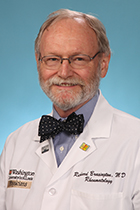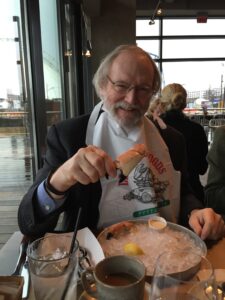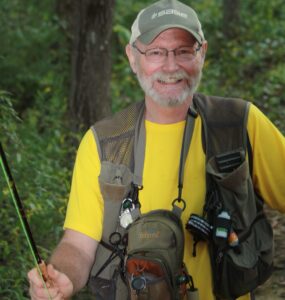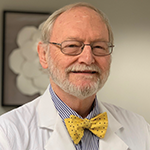 On April 30, 2023, the world lost Richard Brasington Jr., MD, FACP, MACR, an illustrious clinical puzzle master who stopped at nothing to do right by his patients—and to ensure the next generation of rheumatologists would be properly trained. Dr. Brasington, a former associate editor of The Rheumatologist and emeritus professor of medicine at Washington University School of Medicine in St. Louis (WUSTL), was internationally appreciated for his clinical acumen, as well as for his compassionate care.
On April 30, 2023, the world lost Richard Brasington Jr., MD, FACP, MACR, an illustrious clinical puzzle master who stopped at nothing to do right by his patients—and to ensure the next generation of rheumatologists would be properly trained. Dr. Brasington, a former associate editor of The Rheumatologist and emeritus professor of medicine at Washington University School of Medicine in St. Louis (WUSTL), was internationally appreciated for his clinical acumen, as well as for his compassionate care.
“Rick was a great guy and a strong ally and advocate for the pages of The Rheumatologist,” says former physician editor Simon Helfgott, MD, director of Rheumatology Education and Fellowship Training, Brigham and Women’s Hospital, Rheumatology Immunity and Inflammation and associate professor at Harvard Medical School, Boston. “He was passionate about doing the right thing and never shied away from a debate.”
Imparting Excellence
Dr. Brasington, former clinical director of the WUSTL Division of Rheumatology and director of the Rheumatology Fellowship Program, leaves an enduring legacy of mentorship.
“Rick is the reason I am a rheumatologist,” says Alfred Kim, MD, PhD, associate professor of medicine, Division of Rheumatology at WUSTL.
“Rick and I met when I was an intern in medicine at Washington University and he was program director for rheumatology. Initially, I had zero interest in this field and was considering cardiology—in part because rheumatology seemed cryptic. However, I was swayed because Rick made it sound approachable from a problem-solving perspective.
“I was part of a physician/scientist training program, and Rick convinced me that there were a lot of opportunities to integrate rheumatology with bench research. He made rheumatology exciting from a clinical standpoint and assured me that the mysteries in rheumatology were opportunities, not things to be feared,” says Dr. Kim.
In 2018, Dr. Brasington was recognized as an ACR Master. This prestigious honor is conferred on ACR members who are age 65 or older by Oct. 1 of the year in which they are nominated, and who have made outstanding contributions to the ACR and the field of rheumatology through scholarly achievement and/or service to their patients, students and profession.
“Rick had exceptional clinical acumen,” says Dr. Kim, “which I tried to emulate at every possible turn. He was truly a clinical virtuoso, able to detect subtleties in someone’s history and physical exam that would allow him to arrive at a diagnosis that most clinicians would miss. For example, we once had a patient who appeared to have lupus due to positive anti-nuclear antibodies and double-stranded DNA tests, a rash in the malar distribution and joint pain, but a fuzzy history of photosensitivity. As a fellow I thought it had to be lupus. But Rick knew something was amiss with the patient history and posited a diagnosis of sarcoidosis—which then was found on a skin biopsy. I was astonished.”
Among many of his talents, Dr. Brasington possessed an unusual ability to examine something from various perspectives, says Dr. Kim. “Rick taught me to put as much passion into telling myself why I was wrong as why I was right. He said that if I were so convinced of a diagnosis, then I should take a breather and try to come up with an argument for why I was wrong. Rick often pointed out that our objective measurements aren’t as precise as they should be, so we have to tease out our biases.
“Rick Brasington wasn’t perfect, and everyone who knew him was aware of that. But it was clear that when he did get into a conflict it was not out of malicious intent; it was to ensure those around him were never left out of the conversation. If rules and regulations got in the way of good treatment, well, that wasn’t going to stop him. He would sacrifice himself to defend others. Rick became a close friend and confidant, even performing the wedding ceremony for me and my wife,” says Dr. Kim. “He is terribly missed.”
A Positive Environment
 Echoing Dr. Kim’s sentiments, Jonathan Miner, MD, PhD, associate professor of medicine, University of Pennsylvania, Philadelphia, says, “Rick was the reason I went into rheumatology. I was planning on going into hematology, but Rick was my attending on the rheumatology consulting service during my intern year. His caring demeanor was inspiring to me and others. He made the learning environment positive, and you could see how much joy it brought Rick to be able to teach fellows and treat patients. It made me want to become a rheumatologist.
Echoing Dr. Kim’s sentiments, Jonathan Miner, MD, PhD, associate professor of medicine, University of Pennsylvania, Philadelphia, says, “Rick was the reason I went into rheumatology. I was planning on going into hematology, but Rick was my attending on the rheumatology consulting service during my intern year. His caring demeanor was inspiring to me and others. He made the learning environment positive, and you could see how much joy it brought Rick to be able to teach fellows and treat patients. It made me want to become a rheumatologist.
“Rick never discounted any trainee’s thoughts or ideas. Even when a trainee was wrong, Rick would listen closely, and he would respond supportively to help build the trainee’s confidence. His desire to inspire—and the empathy with which he treated patients and trainees—was exceptional. With patients, Rick would engage in a true, shared decision-making process where he would present the patient with options and ask which they preferred.”
Dr. Miner continues, “I cannot overstate that Rick had a huge halo effect (i.e., his presence made the entire group better); this halo effect went beyond the people in his immediate vicinity. He was the go-to person when anyone had questions about patients or a disease process or training. In fact, Rick’s halo effect was far greater than one institution because of his papers, his impact on former trainees and his role in supporting other doctors all around the U.S. and internationally.
Rick also didn’t care about politics and wouldn’t mince words when he thought something might negatively impact patients or trainees. Upon his departure from Washington University (WashU), there was a palpable void in the department. Fortunately, at the time of his death, he had identified another wonderful opportunity outside of WashU, where he would again have the chance to enjoy patient care and teaching.
“While clinical work and training took up most of his attention, Rick also had tremendous scholarly capabilities,” Dr. Miner adds. “Even though he wasn’t a physician-scientist, he was extremely supportive of scholarly work, including bench research—and he understood basic science. He was also a great writer, who wrote as well as any physician-scientist or clinician investigator.”
With Compassion for All
Lacey Feigl-Lenzen, fellowship program administrator in the Division of Rheumatology and clinical coordinator of the Washington University Lupus Clinic, knew Dr. Brasington for 15 years. “I think he is probably the most caring person I’ve ever known. I was only 19 when I began working in clinic with him at the front desk. He was one of those people who paid no attention to whether you were a doctor, staff or patient—Rick treated everyone with respect. He had a quick wit, and he knew he could make you laugh.
“At one point, I was his patient, so I got to see the care and attention that he gave to people who came to him for help,” continues Ms. Feigl-Lenzen. “He took a lot of time to talk to me, which is so unusual given medicine’s current environment where you are allotted only 15 minutes with each patient. He was very aware that some of his patients had no support at home and he wanted to try and make up for that in some way.
“Through his behavior, such as staying longer for appointments or covering when a colleague was ill, Rick taught me about true compassion. He went the extra mile to help ensure that the people who worked with him and those in his life were taken care of.”
Wayne Yokoyama, MD, is the Sam J. Levin and Audrey Loew Levin Chair for Research of Arthritis, professor of medicine and chief of the Division of Rheumatology at WUSTL. Dr. Yokoyama first met Dr. Brasington in 1979 while at the University of Iowa.
“Rick joined the University of Iowa for a rheumatology fellowship, where I was already a fellow. He aspired to become an academic, research-oriented rheumatologist, but when that didn’t work out, he became an outstanding clinician and developed outreach rheumatology clinics at the Marshfield Clinic in Wisconsin,” says Dr. Yokoyama.
“Years later (1996) when I ended up as chief of rheumatology at WUSTL and decided that we needed more clinical help, I asked Rick if he would be interested in having an academic rheumatology practice. To my surprise, he said ‘Yes,’ joined the faculty, helped us immensely in clinic, then set his sights on reinvigorating our fellowship program. He was a big hit with the fellows because he took a personal interest in their well-being and success. Each year our division would sponsor a party at the ACR annual meeting, and it was heartwarming to see what a thrill they got from reconnecting with Rick.
“When Rick joined us, rheumatology across the nation was not thought of very well. This was a time when many internal medicine subspecialty fellowships were suffering because general internists were making very high starting salaries, suggesting to many that it didn’t make much sense for young internists to go into non-procedure-oriented subspecialties like rheumatology. But we felt we needed to train the next generation of rheumatologists who could best advocate for our patients and offer them exceptional care.
“Rick did a lot to help turn things around at Washington University and to make our program thrive. He also volunteered his efforts at the Arthritis Foundation and the ACR, having a greater impact at the national level. As far as his legacy, he trained the next generation of clinical rheumatologists from our program and beyond, who are now spreading his education, skills and compassion around the globe.”
“Richard ‘Rick’ Brasington Jr., MD, embodied the role of teacher, mentor and sponsor,” says Lisa Zickuhr, MD, MPH, a rheumatologist at Washington University Physicians. “My first rheumatology teacher at Washington University at St. Louis School of Medicine, he introduced me to synovial fluid analysis during the summer lecture series of my intern year, a lineup of sessions designed to get newbie residents up to par. ‘Call a rheumatology consult if you’d like an extra thoughtful interpretation of synovial fluid results,’ he advised cheekily, leaning into the stereotype that rheumatologists think a lot. Ooh! I thought. This guy is funny and wise!
“I owe a great deal to Rick for his role in my life as a master clinician and educator, a wise mentor and a fierce sponsor,” Dr. Zickuhr says. “I am grateful for his examples of integrating humor with teaching, humility with excellence, and a cocktail with scholarly conversation. Thank you, Rick, for your insightful Rick-isms and questions while, most importantly, helping those of us around you achieve our vision of ‘What do we want to be?’”
Family & Fishing
 Kathleen Ferrell was married to Rick Brasington for 25 years. But it was a friendship that started it all. “I am a physical therapist, and I had a grant from the Missouri Department of Public Health; Rick’s office was just across the hall. We had a dear friendship for nine months and got the privilege and pleasure of being together for the next 25 years. Just before he passed away, he told me that we were the perfect life partners.
Kathleen Ferrell was married to Rick Brasington for 25 years. But it was a friendship that started it all. “I am a physical therapist, and I had a grant from the Missouri Department of Public Health; Rick’s office was just across the hall. We had a dear friendship for nine months and got the privilege and pleasure of being together for the next 25 years. Just before he passed away, he told me that we were the perfect life partners.
“I admired that whatever Rick did, he did with vigor—there was no halfway. Teaching was instinctive for him. I could ask him a question about something, and he would quickly drop into teaching mode. As Rick grew older, he saw teaching as his legacy—the ability to share his experience. He wanted his fellows to be the best, and he was great at seeing the potential in people and extracting it.
“He could sometimes seem like an absent-minded professor. One evening at a dinner, a woman looked at him and said, ‘Are you an absent-minded professor or do you just look like one?’
“Rick was a genuinely good person who was wonderful with our kids and grandkids. He later developed an interest in fly fishing; it became such a passion that we bought a home near a stream in the Ozarks so he could just step outside the back door and go fishing. I think it brought him peace.”
Elizabeth Hofheinz, MPH, MEd, is a freelance medical editor and writer based in the greater New Orleans area.

